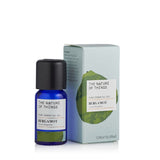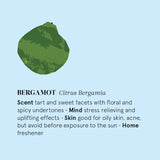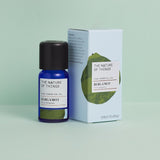Bergamot essential oil is highly touted for its soothing use as an aromatherapy treatment. Here are a few ways you can keep its scent close:
- Mix bergamot essential oil with a carrier oil to use as a body lotion or for massage.
- Add two to five drops of Bergamot essential oil to products such as body wash, shampoo, and facial scrubs.
- Use it as an ingredient in aromatherapy. For example, bergamot essential oil can be added to scent homemade candles and air fresheners. You can also dab it in vaporizers to distribute its scent in a room or add it to potpourri.
- Dab it on a bandana or handkerchief for a soothing scent on-the-go.
Several compounds in bergamot oil have antibacterial and anti-inflammatory properties. This may make bergamot oil an effective spot treatment for acne in people who do not have sensitive skin. Its analgesic qualities may also make it effective against painful cysts and pimples.
To use bergamot oil as a spot treatment:
- Apply bergamot oil mixed with a carrier oil directly to pimples, cysts, and blackheads.
- Leave on overnight.
- Do not use or leave this treatment on during the day or in sunlight.
You can also mix the diluted oil into water or your favorite cleanser to use as a facial rinse.
Bergamot oil enthusiasts (and people who love soft, lightly scented hair), swear by this essential oil’s ability to soften and tame curls. Anecdotal evidence indicates that bergamot oil may also be soothing to an irritated scalp.
To use, put a few drops in your usual shampoo. You can also mix one to two drops with a tablespoon of carrier oil and massage it into your scalp as an overnight treatment.
Using bergamot oil with other essential oils
Many other essential oils can provide similar benefits. Try experimenting with the ones you like, and mixing them with each other. Some to try include:
- Lavender oil. Lavender is a classic scent for aromatherapy. It’s often used in skin, hair, and acne products and treatments.
- Tea tree oil. Touted for its antibacterial properties, tea tree oil may fight acne and soothe skin inflammation.
- Chamomile oil. Soothing as a tea or on the skin, chamomile may also elevate mood.
Research on bergamot oil has uncovered multiple benefits. These include:
Stress reduction
A small 2015 studyTrusted Source done on women in Japan found that inhaled bergamot oil mixed with water vapor reduced feelings of anxiety and fatigue.
Similarly, a 2013 article published in the journal Current Drug TargetsTrusted Source reported that aromatherapy with bergamot (among other essential oils) can relieve depression, anxiety, and other mood disorders by signaling the brain to release dopamine and serotonin.
Fights food poisoning
Linalool, a compound found in bergamot, may sometimes be effective at destroying types of bacteria responsible for food-borne illnesses.
A 2006 studyTrusted Source examined bergamot’s effectiveness at destroying several strains of bacterium on chicken skin and cabbage leaves. The bacterium tested were:
- Staphylococcus aureus
- Listeria monocytogenes
- Bacillus cereus
- E. coli O157
- Campylobacter jejuni
Study findings suggested that bergamot essential oil may be effective when used against these types of bacteria, but also indicated that additional studies are needed.
A 2016 studyTrusted Source tested the effect of different types of bergamot essential oil against strains of Listeria monocytogenes, the bacteria that causes listeriosis infection. Researchers used listeria samples from different sources including fish and poultry.
The different formulations of bergamot had weak to strong effects at stopping the growth of the different bacteria samples. Given the variability, researchers concluded that bergamot essential oil’s effectiveness against bacteria in foods should be estimated.
Lowers cholesterol
A 2016 reviewTrusted Source of human and animal studies indicated that flavonoids found in bergamot can help reduce lipid levels, although it indicated that the exact mechanism driving this result is unclear.
A 2018 animal studyTrusted Source affirmed this finding. It also found that the polyphenols in bergamot had an anti-inflammatory effect in the livers of rats recovering from nonalcoholic fatty liver disease.
Reduces pain and inflammation
Linalool and carvacrol are compounds found in bergamot oil. A 2017 review of studiesTrusted Source analyzed the effects of multiple essential oil compounds on the pain response and other conditions in humans and animals.
It found that both linalool and carvacrol had analgesic, anticonvulsant, and anti-inflammatory capabilities when used in a variety of methods that included applying it on the skin.
The review also indicated that the potential, toxicological effects of essential oils in humans requires further study.
Bergamot essential oil can be irritating to the skin in some people, especially when it is not diluted with a carrier oil. Essential oils, including bergamot oil, can sometimes cause allergic dermatitis.
Symptoms of an allergic reaction or sensitivity to bergamot oil may include:
- redness
- hives
- burning sensation
- blisters
- pain
You’ll want to test any essential oil first before use. Rub a dime-sized area of your forearm with the oil diluted in a carrier oil. If you don’t see any allergic reaction within 24 hours, it should be safe to use.
Be aware that using essential oils in a diffuser can have a negative effect on children, pets, or pregnant women.
Bergapten, a compound found in bergamot oil, was shown to be phototoxic in a small 2001 study. This means it causes the skin to become irritated or damaged when exposed to sunlight.
In addition to the essential oil, products containing bergamot, such as perfume, may cause a skin reaction. If you are concerned about your skin’s sensitivity to sunlight, look for a bergapten-free version of bergamot oil.
The bergapten in bergamot oil is harmful if swallowed. Even inhaling or using the essential oil topically can interfere with medication. Certain medications, such as ciprofloxacin, an antibiotic, also increase sensitivity to sunlight, increasing bergamot oil’s impact.
It’s important to check for bergamot oil’s interactions with other medications before using. One way to do this is to speak with a pharmacist or your doctor about medications you’re taking and which might interfere with essential oils.
Research points to bergamot essential oil’s ability to reduce inflammation, lower cholesterol levels, and increase positive mood.
It can cause skin irritation or allergic reactions in some people. It can also cause photosensitivity, and should not be left on skin that will be exposed to sunlight.
Bergamot oil has a lovely scent, and may already be an ingredient in your favorite perfume. It’s also available as an essential oil that you can add to your collection. It’s best used diluted with a carrier oil or water.









